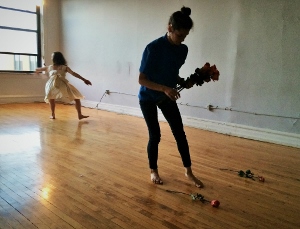
Found in Translation
Contributor’s Marginalia: Virginia Konchan on “On Our Nightly Walk, She Takes My Hand” by Jessica Jacobs
Jessica Jacobs’ “On Our Nightly Walk, She Takes My Hand” is a poem that packs an immense wallop (emotionally, architecturally, intellectually), in six mere couplets. The poem begins almost voyeuristically—a fascinating beginning, considering the intimacy implied in the title—with the speaker observing two girls in an embrace at a dance studio, swaying in time with the music in what is referred to in French as a “pas de deux” (a dance for two people, typically a man and woman, which makes Jacobs’ positioning of the dance between two women all the more resonant). This is a phrase, the speaker tells us, first translated for her (a homophonic surface translation, one imagines), as “piece of God” (pièce de Dieu).
“That’s wrong, of course,// but not entirely,” the speaker continues, and this is where, at line seven, the poem’s volta, impossible not to quote in its syntactically complex and riveting entirety, occurs: “For what is it to move in time/ with another, to acknowledge and learn// a body beside your own—the dancing apart/ and the final coming back// together—what is this if not some kind/ of grace, some human-sized serving of God?”
 What this poem accomplishes in so few lines—moving from the beautifully rendered establishing scene, to a fascinating mistranslation, to a final analogic relationship drawn between a shared dance between humans and the call and response relationship between the Creator and the Created—is nothing short of tremendous. It is reminiscent of Degas, and of the gorgeous lyric and philosophical undercurrents of Yeat’s “Among School Children,” of course (“O chestnut tree, great rooted blossomer, Are you the leaf, the blossom or the bole? O body swayed to music, O brightening glance, How can we know the dancer from the dance?”), but Jacobs’ intervention is tighter, tauter, more cerebral and sensual at once. It traffics, as does Dickinson, in a poetics of recursion and scale, first establishing the image of two dancers entwined, before telescoping out to compare the dance movements to the dream sequence that is a relationship with God—and note that the speaker doesn’t compare the “dancing apart/ and the final coming back/together” to a relationship between the speaker and God, but, more enigmatically, to “some human-sized serving of God” itself, as if acknowledging that in some cosmic sense, God, as in the Yeats poem, is both the subject and object, the love projected and the love received.
What this poem accomplishes in so few lines—moving from the beautifully rendered establishing scene, to a fascinating mistranslation, to a final analogic relationship drawn between a shared dance between humans and the call and response relationship between the Creator and the Created—is nothing short of tremendous. It is reminiscent of Degas, and of the gorgeous lyric and philosophical undercurrents of Yeat’s “Among School Children,” of course (“O chestnut tree, great rooted blossomer, Are you the leaf, the blossom or the bole? O body swayed to music, O brightening glance, How can we know the dancer from the dance?”), but Jacobs’ intervention is tighter, tauter, more cerebral and sensual at once. It traffics, as does Dickinson, in a poetics of recursion and scale, first establishing the image of two dancers entwined, before telescoping out to compare the dance movements to the dream sequence that is a relationship with God—and note that the speaker doesn’t compare the “dancing apart/ and the final coming back/together” to a relationship between the speaker and God, but, more enigmatically, to “some human-sized serving of God” itself, as if acknowledging that in some cosmic sense, God, as in the Yeats poem, is both the subject and object, the love projected and the love received.
Lastly, the title. The title telescopes the reader back once again, this time to an intimate moment between the speaker and the beloved, creating a kind of third reading of the poem, alongside (or, rather, anterior to) that of the dancers and the tentacular, omnipresent God.
Whence comes the desire to make contact with another body, and, in terms of the opposing impulse, to reject another body, in the changing tides of attraction and repulsion?
This poem plies those mysteries in the slimmest of spaces: for this and other reasons, it’s a triumph.
